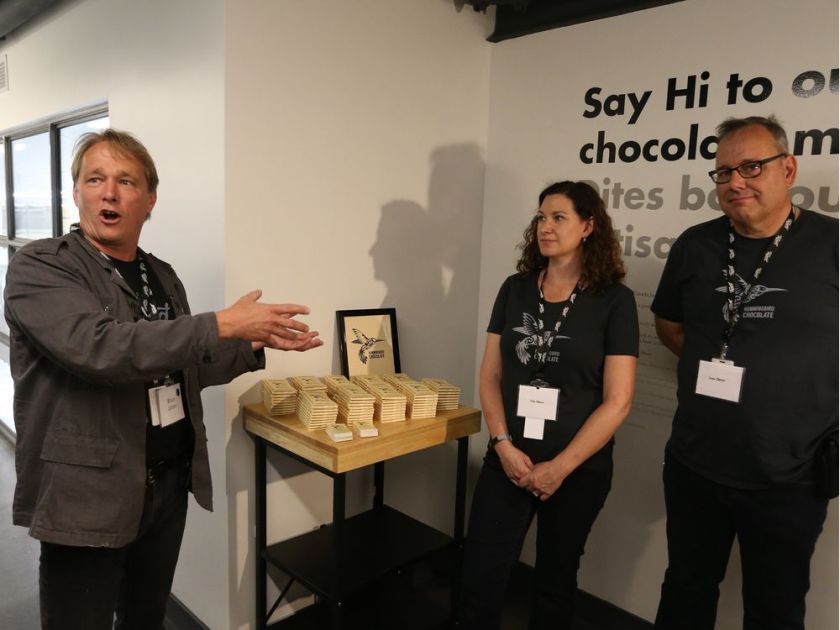You are here
Home 🌿 Recreational Marijuana News 🌿 Eyeing legal edibles, weed giant teams up with Almonte chocolate-maker Hummingbird 🌿Eyeing legal edibles, weed giant teams up with Almonte chocolate-maker Hummingbird

That’s because Hummingbird, which was launched in 2011 by Erica and Drew Gilmour, recently partnered with Canopy Growth Corp., the Smiths Falls-based, publicly traded marijuana company, to press ahead with creating a THC-laced chocolate product that could arguably appeal to gourmets who fancy a tasty buzz.
There is, of course, one big proviso. Production of such a product could only begin “if and when it becomes legal to do so,” Erica Gilmour says.
While recreational cannabis became legal in Canada this week, the legalization of edible pot products, which are hugely popular in other markets, has been put off because regulating them is especially complex.
Hummingbird is one of the few Canadian companies that makes chocolate from scratch from cacao beans. Some of their high-end bars, which are carried in about 50 Ottawa stores, including Farm Boy locations, showcase single-origin chocolate that has been made from one variety of cacao harvested in one region.
Canopy Growth, whose CEO is Ottawa businessman Bruce Linton, wants Hummingbird to take the same uncompromising approach to make cannabis-laced chocolate, Drew Gilmour says.
“What is really extraordinary is that they want to do it directly from cacao beans,” whereas U.S. cannabis producers making chocolate products buy their chocolate from multinational companies, Gilmour continues.
“You’re not sure of the quality of chocolate or how the chocolate was produced or if the cacao beans were produced ethically,” he says.
But Canopy has taken “the laborious step, the really hard step, of making the chocolate from scratch. That’s really something unique,” he says.
Canopy Growth’s Linton calls partnering with Gilmours, who are based about 40 minutes away from the Smiths Falls facility, “a totally right fit.” Linton said he wanted to “do this really right and make sure everyone does well by it.”
Regardless of what happens regarding edible cannabis products in Canada, the Canopy-Hummingbird partnership will produce chocolate for sale, even if it contains no cannabis. Linton is pleased that his facility, which is the former Hershey plant in Smiths Falls, will once again produce chocolate.
He said he jokingly tells people that he bought the Hershey plant, which closed in 2008 after 45 years of operation, because he “needed to find out why the Oompa Loompas were so happy.
“A big place that makes marijuana and chocolate, people generally appreciate the symmetry of that,” he added.
“A big place that makes marijuana and chocolate, people generally appreciate the symmetry of that,
Most of the equipment needed to make chocolate has been installed at the Smiths Falls facility, Erica Gilmour says. She said that in the next few months, the facility should be able to make chocolate “just to get ready for possible legalization.”
The Gilmours will help manage chocolate production there, but Hummingbird chocolate proper will continue to be made in Almonte. The two product lines will “continue to be completely separate,” Erica Gilmour says.
It hasn’t been decided how the products of the Canopy-Hummingbird partnership will be branded. Meanwhile, Canopy Growth will make recreational marijuana products under the Tweed brand and medical marijuana products under the Spectrum brand.
Erica Gilmour is piqued by the challenge of creating a truly tasty blend of chocolate and cannabis.
“It’s an interesting thing from a taste perspective, because cacao beans have a very unique flavour based on the origin of the bean and how they’re treated.
“I think there’s an opportunity here to play with the flavours of cannabis, and maybe pair those with different cacao beans. We’re still in the early stages … so we’ll see how all that plays out.”
Says Drew Gilmour: “It’s going to be a three-ingredient product. Cacao beans, sugar and cannabis. … We may add some flavours.”
He even brings “terroir” — the notion beloved by foodies that food and wine reflect and reveal where they came from — into the conversation.
“With regard to the THC, it’s grown right here, and with regard to the cacao beans, we go down south, we meet the farmers and their families and their communities and we see it being cultivated,” Drew Gilmour says. “It’s really an interesting story about origin and terroir.”
Could the Gilmours see one of their cannabis chocolate products one day vie for an award for the best edible?
“That’s certainly possible,” Erica Gilmour says.
U.S. chocolate-and-cannabis products have been made and been honoured by the Cannabis Cup, the couple says.
420 Intel is Your Source for Marijuana News
420 Intel Canada is your leading news source for the Canadian cannabis industry. Get the latest updates on Canadian cannabis stocks and developments on how Canada continues to be a major player in the worldwide recreational and medical cannabis industry.
420 Intel Canada is the Canadian Industry news outlet that will keep you updated on how these Canadian developments in recreational and medical marijuana will impact the country and the world. Our commitment is to bring you the most important cannabis news stories from across Canada every day of the week.
Marijuana industry news is a constant endeavor with new developments each day. For marijuana news across the True North, 420 Intel Canada promises to bring you quality, Canadian, cannabis industry news.
You can get 420 Intel news delivered directly to your inbox by signing up for our daily marijuana news, ensuring you’re always kept up to date on the ever-changing cannabis industry. To stay even better informed about marijuana legalization news follow us on Twitter, Facebook and LinkedIn.




